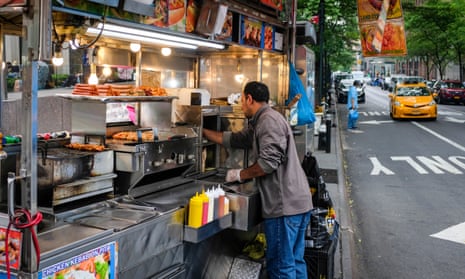Mohamed Mohamed sells coffee and halal food to hungry hordes of tourists and office workers in lower Manhattan, hoping to earn enough to support his wife and two kids and eventually put them through college.
But out of his modest profits, Mohamed has to shell out $25,000 every two years for a permit that allows him to do business on city streets.
“There’s nothing left. Trust me. Nothing left,” he said.
Thousands of street vendors sell food in New York, from the hotdog and pretzel sellers who have long been a part of the city’s streetscape, to immigrants from around the world who today sell everything from Colombian arepas to Tibetan momos.
But vendors say they are getting squeezed, since the city’s cap on vending permits has not budged since the early 1980s.
That means many vendors are forced to go on the black market and pay tens of thousands of dollars to use permits the city gives out for just $200 – or work illegally and face tickets and fines.
The street sellers are pushing legislation that would lift the cap, allowing the city to issue new permits for the first time in decades. The bill, considered by the city council on Thursday, would offer about 4,000 new permits over the course of a decade, doubling the current number.
“It would be much better for my kids. They could have a better life, to be honest with you. I could at least save for their college,” said Mohamed, 37, who moved to New York from Egypt 14 years ago.
The change is controversial, fought by chambers of commerce, neighborhood business associations and real estate owners who say vendors take business from bricks-and-mortar stores, and cause congestion on the sidewalks.
Jessica Walker, president of the Manhattan chamber of commerce, said local businesses “suffer from the lack of an even playing field” since they have to pay high rents and other costs not faced by vendors.
“It cannot be at the expense of many small business owners and storefronts who are already struggling,” she said.
Opposition killed a prior effort to overhaul vending laws, but politicians have revived it.
Los Angeles in the fall legalized street vending for the first time, and did not put a limit on the number of permits.
“It is unjust and immoral to punish hardworking people for simply trying to make a living,” said city councilwoman Margaret Chin, who is sponsoring the legislation.
Street vendors at a rally in New York carried signs in the shape of hotdogs, pretzels and coffee cups as they urged officials to change the rules.
Maria Marin, 45, said selling tamales on the street in Brooklyn is one of the few jobs she can do around her treatments for cancer. She works without a permit, so police can fine her and confiscate her shopping cart and supplies if she is caught.
“I am a single mother. I have four kids to feed,” she said, adding that with a permit, “my life would be totally different, because I wouldn’t have any problems with the police, and I would be able to do my job”.
The proposal would also create a new enforcement unit for vending rules, and require new permit holders to work their carts themselves in an effort to eliminate the black market.
Mayor Bill de Blasio’s administration said they did not support it, since they think rules on when and where vendors can sell should be overhauled first.
But Walid Abdelwahab, 37, said that after waking up at midnight to prepare his coffee and breakfast cart on Manhattan’s Upper West Side, he wants to be able to work without resorting to the expensive underground permit market.
“It’s a hard job every day in the street. So we just need our rights,” he said.
